2024届高考英语二轮复习介词复习课件 (共47张PPT)
文档属性
| 名称 | 2024届高考英语二轮复习介词复习课件 (共47张PPT) | 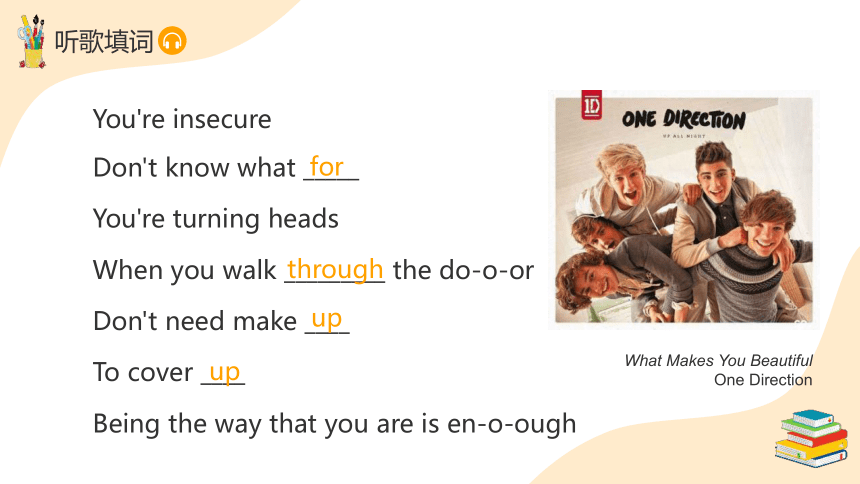 | |
| 格式 | pptx | ||
| 文件大小 | 5.5MB | ||
| 资源类型 | 教案 | ||
| 版本资源 | 通用版 | ||
| 科目 | 英语 | ||
| 更新时间 | 2024-03-09 20:45:25 | ||
图片预览

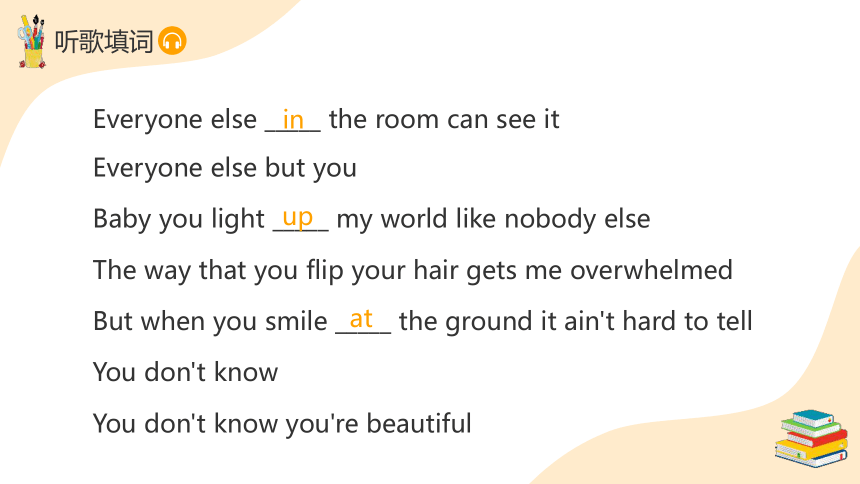
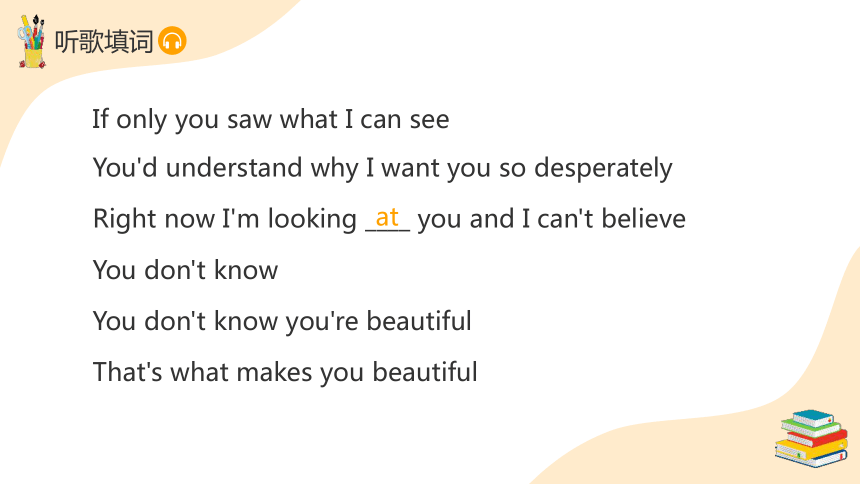
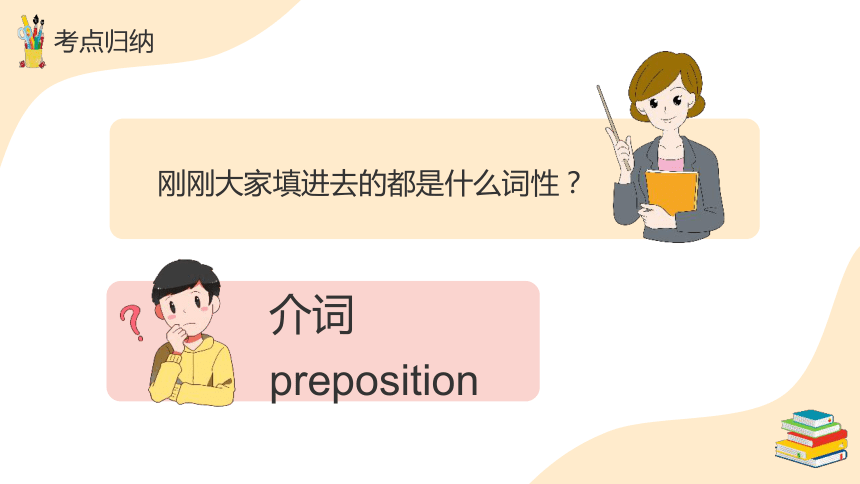


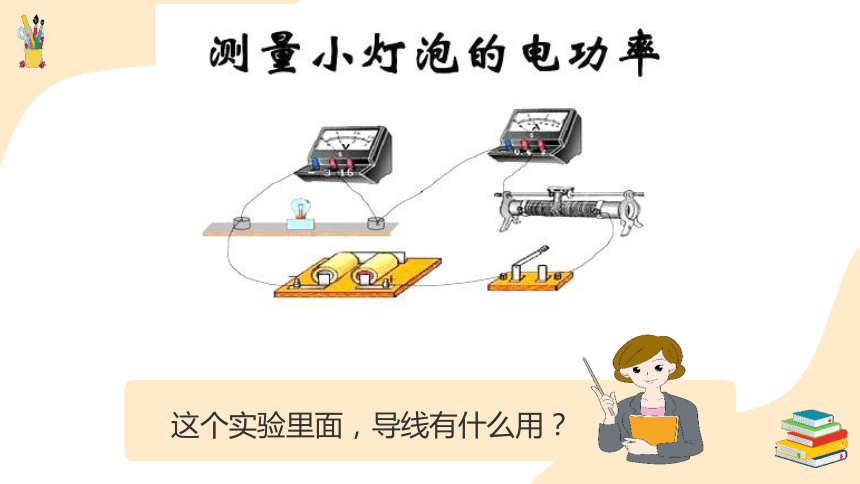



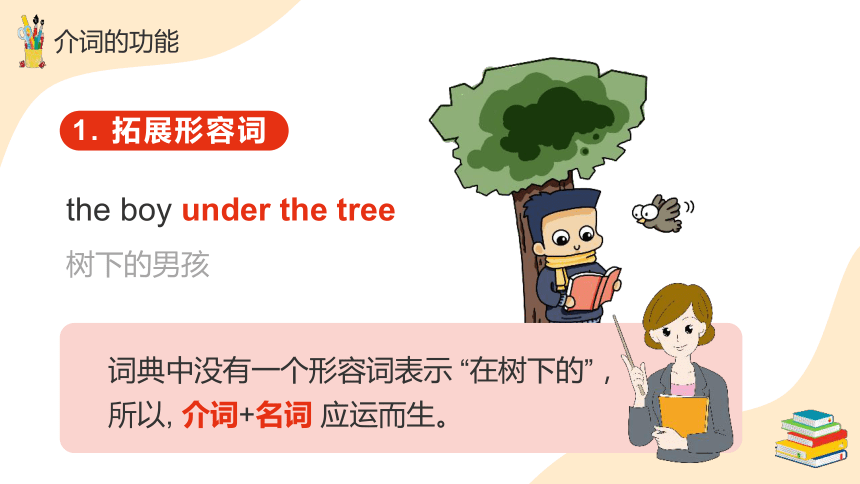

文档简介
(共47张PPT)
听歌填词
You're insecure
Don't know what _____
You're turning heads
When you walk _________ the do-o-or
Don't need make ____
To cover ____
Being the way that you are is en-o-ough
What Makes You Beautiful
One Direction
for
through
up
up
图标可点击
听歌填词
Everyone else _____ the room can see it
Everyone else but you
Baby you light _____ my world like nobody else
The way that you flip your hair gets me overwhelmed
But when you smile _____ the ground it ain't hard to tell
You don't know
You don't know you're beautiful
in
up
at
图标可点击
听歌填词
If only you saw what I can see
You'd understand why I want you so desperately
Right now I'm looking ____ you and I can't believe
You don't know
You don't know you're beautiful
That's what makes you beautiful
at
图标可点击
考点归纳
介词preposition
刚刚大家填进去的都是什么词性?
介词和动词短语
介词和介词短语
preposition
高/中/语/法/系/列/课
探索发现
为什么要用介词?
它是做什么用的?
这个实验里面,导线有什么用?
同理,介词在英语中
也起到连接的作用。
探索发现
连接不同的器材。
考点归纳
用来调节电阻
来改变电流大小。
滑动变阻器有什么用?
同理,英语中的介词也是用
来调节词义,同一个词跟不
同介词搭配会产生意义上的
改变。是词义的拓展。
look for寻找
look into 调查
探索发现
the boy under the tree
树下的男孩
介词的功能
1. 拓展形容词
词典中没有一个形容词表示 “在树下的”,
所以, 介词+名词 应运而生。
The boy is looking for his book.
男孩在找他的书。
介词的功能
2. 拓展动词
Look 本身没有 “寻找” 的含义,但是
加上介词for以后,连接了动词和名词
拓展了动词的含义。
1.知识导图
介词
prep.
介词分类(形式)
句法功能
简单介词:at,on,in, after,before, with, for,to,…
合成介词:into,within, without…
双重介词:from behind, from among…
分词介词:including, regarding, concerning…
短语介词:at the back of, instead of , because of..
1.介词不能单独使用,但“介词+宾语”构成的介词短语可在句中作定语、表语、状语、宾补
2.介词后的宾语可以是名词、代词、v ing、疑问词+不定式、从句等。
介词分类(意义)
时间,方位,方式,其它
介词作用
连接,改变词义
02
考点精析
考点一 常考介词的用法
1.表示时间的介词
1.at+时刻。如:at 6 am
2.on+星期几、具体的某一天、具体的某一天的上午、下午或晚上。如on Monday afternoon、on Friday、on 12th Jan.等
3.in+年、月、季节,年代这种比较长的时间段。如in the 1980s、in winter、in September、in the morning、in 2002等
4.in/after+时间段表示“在……之后”。“in+时间段”常与将来时连用,
“after+时间段”常与过去时连用,相当于“一段时间+later”
5.since+时间点,表示“自从……以来” since 1998
for+时间段,表示“长达……” for three weeks
6.from+时间点 从... from 3 pm to 5 pm
He returned home after a week/ (a week later).
他一周后回到了家里。
They will come to visit us in a week.
他们一周以后会来看望我们。
02
考点精析
1.表示时间的介词
until/till 直到……为止
by 到……为止、不迟于……
during 在……期间
brfore 在……之前
over 在……期间、直到……结束
through 一直,自始至终
within 在...之内
02
考点精析
(1)当时间名词前有this、that、last、next、every、each等词修饰时,通常不用任何介词; this year,each time,last month,that morning。
(2)“on/upon+名词或动词 ing”结构可以表示“一……就……”。
On his arrival,we can have lunch.
(3)at后加时间段的短语
at dinner time在吃晚饭时
at meal times 在饭点
at/on the weekend 在周末
重点记忆
02
考点精析
(4)当时间状语是today, yesterday, tomorrow, tonight, yesterday morning (afternoon, evening),tomorrow morning (afternoon, evening)等时;或由all构成的短语作时间状语,如all day, all the week, all the year等前不加介词
There was a football match yesterday evening.
They will go to the zoo tomorrow.
My mother was busy all day yesterday.
The girl was ill in bed all the week.
重点记忆
02
考点精析
介词 用法
on 在....表面上,反义词beneath在...下面
above 在上方,离开表面,不垂直,反义词below
over 在垂直上方,离开表面,反义词under
2.表示方位的介词
02
考点精析
介词 用法
in front of 在外部前面
in the front of 在内部前面
behind 在外部的后面
at the back of 在内部/外部的后面
2.表示方位的介词
02
考点精析
介词 用法
across “从……的表面穿过,在……对面”
through “从……的内部穿过”
past 从...经过 He walked past me.
over “从……的上方越过”
along “沿着”
by 在....旁边
next to 紧挨着
near 在...附近close to
beside 在..旁边
2.表示方位的介词
介词的方位
through
介词的方位
across
介词的方位
along
He walked across the square to meet us.他走过广场来迎接我们。
The guide led us through the forest.导游带着我们穿过了森林。
The thief jumped over the fence and ran away.那个小偷跳过篱笆,逃跑了。
She walked past the shop.她从那家商店旁走过。
She was standing beside her mother.她站在她母亲旁边。
There is a small house by the river.河边有座小屋。
There is a supermarket near my home. 我家附近有一家超市。
He lives next to me.他住在我隔壁
02
考点精析
介词 用法
at 后常接相对较小的地方
in 后常接相对较大的地方或在某一个大的范围之内,在...里
on 意为“在……表面上”(反义词:beneath在...下面)
2.表示方位的介词
02
考点精析
介词 用法 在..方位
in 在某一范围内
on 与..接壤
to 不接壤
off (时空)上离/距....不远,偏离
2.表示方位的介词
用法
3. in on off, to
1. Shangdong Province is _____ the northeast of Hubei province.
2. Russia is ____ the northeast of China.
3. Shangdong Province is ____ the east of China.
4. Lily lives in a flat just ______ Park Avenue公园大道.
to
in
on
to
off
on
in
off
02
考点精析
介词 用法
inside 在...里
outside 在...外面
into 进入
out of 出来
between 在两者之间 between A and B
among 在..之中 三者或以上
from 从(起点)
around 环绕
2.表示方位的介词
“by+名词”表示交通方式时,名词前不加冠词;但是in,on 后的名词前必须有冠词或代词等。
He goes to work by car every day.
他每天开车去上班。
He goes to work in his car/on his bike every day.
他每天开车/骑车去上班。
3.表示交通方式的by,in,on
4.表示用..方式的介词
表示“用”:in/with/by
by表示使用方式、方法等(名词前不用修饰词,也不用复数)。
by machine/force 机器/武力
learn English by watching films 看电影学英语
with表示用具体的工具、身体部位。
with a pen 用钢笔 with his hand用他的手
in表示用材料、以某种度量单位、语言、声音或活动方式等。
in ink用墨水
measure the cloth in meters 以米为单位来测量布(单位复数)
live in groups 群居(方式)
in English 用英语
in a sweet voice以甜美的声音
5.表示“如,像”的介词as和like
as表示“如,像”时,可以用作介词,也可用作连词。like表示“如,像”时,用作介词或连词。like含有“好像是”之意,意指“实际上不是”。而as表示“作为”,意指“实际上是”。二者不可在同一个语境中同时使用。
I long to fly like a bird in the sky.
我渴望像鸟儿一样在空中飞翔。
They were all dressed as clowns.
他们都打扮成小丑。
6.表示“比较”的介词
介 词 用 法 例 句
than比
to比
形容词、副词比较级+than
be superior to 优于
be inferior to 劣于
be senior to 年长于
be junior to 年幼于
be prior to 优先于
He runs faster than his brother.
Bob's strength is superior to mine.
Your father is senior to hers.
用介词than,to填空
(36) Divorce is more common _________ it was a generation ago.
(37) My brother is senior _______ me by two years.
than
to
其它介词
介词(短语) 用法
besides “除……之外(还有)”,相当于in addition to,包括后面提到的
except “除……之外”,不包括后面提到的,在同类的整体中除去一个部分
except for “除……之外”,从整体中去除一个细节,一个方面,后接的词与句子的整体词不是同类
but “除……之外”(=except),常用于nobody,none,no one,nothing,anything,eryone,all之后
apart from 既可相当于besides或in addition to,也可相当于except for
other than “除……之外”相当于except
7.表示“除……之外”的介词(短语)
All went home besides/apart from/in addition to Tom. 除了所有人之外还有汤姆也回家了。
Nobody knows the address except/but me. 除了我,没有人知道那个地址。
The room is clean except for/apart from some paper. 除了一些纸以外,屋子很干净。
The composition is wonderful except for/apart from a few spelling mistakes. 除了一些拼写错误,这篇作文很棒。
(1)but常用于nobody、none、no one、nothing、anything、everyone、all 之后。接不定式时,如果but前有do的某种形式,则省略不定式中的to;前有do后无to,前无do后有to
No one can do it but him.
I heard nothing but the wind.
She has no choice but to wait.
He did nothing but play games all day.
(2)besides还可作副词,意为“另外、而且”。
重点记忆
考点二:介词的其他常见用法
1.有些句型中的介词常可省略,常见的此类搭配有
spend money/time(in) doing sth.花费时间/金钱做某事,
waste some time(in)doing sth.浪费时间做某事,
have difficulty/trouble(in) doing sth.做某事有困难,
be busy(in)doing sth.忙于做某事,
stop/ prevent sb.(from) doing sth.阻止做某事等。
2.“of+n.”表示特征(相当于名词的形容词)
of benefit有益处的(=beneficial)
of help有帮助的(=helpful)
of importance重要的(=important)
of interest有趣的(=interesting)
of significance有意义的(=significant)
of use有用的(=useful)
of value有价值的(=valuable)
表示伴随、原因、条件、方式等。(根据上下文意思)结构如下:
现在分词 (表主动进行)
过去分词(表被动/完成)
不定式 (表将来)
形容词
副词
介词短语
with+宾语+ 宾补
(表性质、状态等)
3.with引导独立主格结构(或叫复合结构)
He often sleeps with the windows open.
他经常开着窗子睡觉
She said goodbye with tears in her eyes.
她含着眼泪道别
He sat there with his eyes closed.
他闭目坐在那儿
I can’t go out with homework to do.
我不能出去因为要做作业
4.误用介词的情况--多用介词
(方框里的词是多余的)
benefit for us 使我们受益,对我们有益 go to home/there/abroad 回家/去那儿/去国外
board onto the ship/plane/train 上轮船/飞机/火车 discuss about the plan 讨论计划
engage/marry/divorce with sb. 跟某人订婚/结婚/离婚 enter into the room 进屋
equal(v.) to/with sth. 与某事物相等 match(v.) with 与……相配
return to sth. 归还某物 serve for the people 为人民服务
suit/fit(v.) for sb. 适合某人 visit(v.) to sb./sth. 参观、访问某人/物
hunt 猎捕/杀 search 搜查+地点 prepare 准备
hunt for寻找 search for 寻找+找的东西 prepare for 为……做准备
choose 选择 hope 希望 wish 希望
choose from 从……中选择 hope for 希望得到 wish for 希望得到
add 加上 (后面接新增加的) know 知道,认识
add to 增加,加到……上 (后面接原来就有的) know of 知道……的存在,知道有
add up to 总计达 (后面接总和) know about 了解(……的情况)
hear 听见 ask 问
hear of 听说……的存在,听说有 ask for 索要
hear about 听说……的情况 beg 乞求
hear from 收到……的来信 beg for 乞讨,讨要
5.有无介词意义不同
介词
in case of 万一
in spite of/despite 尽管
because of 因为
with 随着
连词
in case 万一
though/although 尽管
because 因为
as 随着
6.几组介词与连词勿混淆
7. to +one’s+情感名词 “令某人...的是”
(much) to one’s
delight
surprise
horror
sorrow
joy
regret
=to the +名词+ of sb.
高兴
惊讶
恐惧
悲伤
高兴
遗憾,后悔
8.It is+adj.+of sb. to do sth. 与It is+adj.+for sb. to do sth.
的区别
句 型 用 法 例 句
It is+adj.+of sb. to do sth.
It is+adj.+for sb. to do sth.
形容词说明人的性格特征:kind, good, nice, clever, stupid, foolish, considerate, polite, impolite, cruel等
形容词说明不定式的特点:important, necessary, possible, impossible等
It is very kind of the teachers to help support the poor students.
It is quite important for us to protect the environment.
用for 或 of 填空
(41) It is very considerate_______ you to remind me.
(42) It is necessary _______ the students to know some learning methods.
(43) It is possible _______ him to come here soon.
of
for
for
听歌填词
You're insecure
Don't know what _____
You're turning heads
When you walk _________ the do-o-or
Don't need make ____
To cover ____
Being the way that you are is en-o-ough
What Makes You Beautiful
One Direction
for
through
up
up
图标可点击
听歌填词
Everyone else _____ the room can see it
Everyone else but you
Baby you light _____ my world like nobody else
The way that you flip your hair gets me overwhelmed
But when you smile _____ the ground it ain't hard to tell
You don't know
You don't know you're beautiful
in
up
at
图标可点击
听歌填词
If only you saw what I can see
You'd understand why I want you so desperately
Right now I'm looking ____ you and I can't believe
You don't know
You don't know you're beautiful
That's what makes you beautiful
at
图标可点击
考点归纳
介词preposition
刚刚大家填进去的都是什么词性?
介词和动词短语
介词和介词短语
preposition
高/中/语/法/系/列/课
探索发现
为什么要用介词?
它是做什么用的?
这个实验里面,导线有什么用?
同理,介词在英语中
也起到连接的作用。
探索发现
连接不同的器材。
考点归纳
用来调节电阻
来改变电流大小。
滑动变阻器有什么用?
同理,英语中的介词也是用
来调节词义,同一个词跟不
同介词搭配会产生意义上的
改变。是词义的拓展。
look for寻找
look into 调查
探索发现
the boy under the tree
树下的男孩
介词的功能
1. 拓展形容词
词典中没有一个形容词表示 “在树下的”,
所以, 介词+名词 应运而生。
The boy is looking for his book.
男孩在找他的书。
介词的功能
2. 拓展动词
Look 本身没有 “寻找” 的含义,但是
加上介词for以后,连接了动词和名词
拓展了动词的含义。
1.知识导图
介词
prep.
介词分类(形式)
句法功能
简单介词:at,on,in, after,before, with, for,to,…
合成介词:into,within, without…
双重介词:from behind, from among…
分词介词:including, regarding, concerning…
短语介词:at the back of, instead of , because of..
1.介词不能单独使用,但“介词+宾语”构成的介词短语可在句中作定语、表语、状语、宾补
2.介词后的宾语可以是名词、代词、v ing、疑问词+不定式、从句等。
介词分类(意义)
时间,方位,方式,其它
介词作用
连接,改变词义
02
考点精析
考点一 常考介词的用法
1.表示时间的介词
1.at+时刻。如:at 6 am
2.on+星期几、具体的某一天、具体的某一天的上午、下午或晚上。如on Monday afternoon、on Friday、on 12th Jan.等
3.in+年、月、季节,年代这种比较长的时间段。如in the 1980s、in winter、in September、in the morning、in 2002等
4.in/after+时间段表示“在……之后”。“in+时间段”常与将来时连用,
“after+时间段”常与过去时连用,相当于“一段时间+later”
5.since+时间点,表示“自从……以来” since 1998
for+时间段,表示“长达……” for three weeks
6.from+时间点 从... from 3 pm to 5 pm
He returned home after a week/ (a week later).
他一周后回到了家里。
They will come to visit us in a week.
他们一周以后会来看望我们。
02
考点精析
1.表示时间的介词
until/till 直到……为止
by 到……为止、不迟于……
during 在……期间
brfore 在……之前
over 在……期间、直到……结束
through 一直,自始至终
within 在...之内
02
考点精析
(1)当时间名词前有this、that、last、next、every、each等词修饰时,通常不用任何介词; this year,each time,last month,that morning。
(2)“on/upon+名词或动词 ing”结构可以表示“一……就……”。
On his arrival,we can have lunch.
(3)at后加时间段的短语
at dinner time在吃晚饭时
at meal times 在饭点
at/on the weekend 在周末
重点记忆
02
考点精析
(4)当时间状语是today, yesterday, tomorrow, tonight, yesterday morning (afternoon, evening),tomorrow morning (afternoon, evening)等时;或由all构成的短语作时间状语,如all day, all the week, all the year等前不加介词
There was a football match yesterday evening.
They will go to the zoo tomorrow.
My mother was busy all day yesterday.
The girl was ill in bed all the week.
重点记忆
02
考点精析
介词 用法
on 在....表面上,反义词beneath在...下面
above 在上方,离开表面,不垂直,反义词below
over 在垂直上方,离开表面,反义词under
2.表示方位的介词
02
考点精析
介词 用法
in front of 在外部前面
in the front of 在内部前面
behind 在外部的后面
at the back of 在内部/外部的后面
2.表示方位的介词
02
考点精析
介词 用法
across “从……的表面穿过,在……对面”
through “从……的内部穿过”
past 从...经过 He walked past me.
over “从……的上方越过”
along “沿着”
by 在....旁边
next to 紧挨着
near 在...附近close to
beside 在..旁边
2.表示方位的介词
介词的方位
through
介词的方位
across
介词的方位
along
He walked across the square to meet us.他走过广场来迎接我们。
The guide led us through the forest.导游带着我们穿过了森林。
The thief jumped over the fence and ran away.那个小偷跳过篱笆,逃跑了。
She walked past the shop.她从那家商店旁走过。
She was standing beside her mother.她站在她母亲旁边。
There is a small house by the river.河边有座小屋。
There is a supermarket near my home. 我家附近有一家超市。
He lives next to me.他住在我隔壁
02
考点精析
介词 用法
at 后常接相对较小的地方
in 后常接相对较大的地方或在某一个大的范围之内,在...里
on 意为“在……表面上”(反义词:beneath在...下面)
2.表示方位的介词
02
考点精析
介词 用法 在..方位
in 在某一范围内
on 与..接壤
to 不接壤
off (时空)上离/距....不远,偏离
2.表示方位的介词
用法
3. in on off, to
1. Shangdong Province is _____ the northeast of Hubei province.
2. Russia is ____ the northeast of China.
3. Shangdong Province is ____ the east of China.
4. Lily lives in a flat just ______ Park Avenue公园大道.
to
in
on
to
off
on
in
off
02
考点精析
介词 用法
inside 在...里
outside 在...外面
into 进入
out of 出来
between 在两者之间 between A and B
among 在..之中 三者或以上
from 从(起点)
around 环绕
2.表示方位的介词
“by+名词”表示交通方式时,名词前不加冠词;但是in,on 后的名词前必须有冠词或代词等。
He goes to work by car every day.
他每天开车去上班。
He goes to work in his car/on his bike every day.
他每天开车/骑车去上班。
3.表示交通方式的by,in,on
4.表示用..方式的介词
表示“用”:in/with/by
by表示使用方式、方法等(名词前不用修饰词,也不用复数)。
by machine/force 机器/武力
learn English by watching films 看电影学英语
with表示用具体的工具、身体部位。
with a pen 用钢笔 with his hand用他的手
in表示用材料、以某种度量单位、语言、声音或活动方式等。
in ink用墨水
measure the cloth in meters 以米为单位来测量布(单位复数)
live in groups 群居(方式)
in English 用英语
in a sweet voice以甜美的声音
5.表示“如,像”的介词as和like
as表示“如,像”时,可以用作介词,也可用作连词。like表示“如,像”时,用作介词或连词。like含有“好像是”之意,意指“实际上不是”。而as表示“作为”,意指“实际上是”。二者不可在同一个语境中同时使用。
I long to fly like a bird in the sky.
我渴望像鸟儿一样在空中飞翔。
They were all dressed as clowns.
他们都打扮成小丑。
6.表示“比较”的介词
介 词 用 法 例 句
than比
to比
形容词、副词比较级+than
be superior to 优于
be inferior to 劣于
be senior to 年长于
be junior to 年幼于
be prior to 优先于
He runs faster than his brother.
Bob's strength is superior to mine.
Your father is senior to hers.
用介词than,to填空
(36) Divorce is more common _________ it was a generation ago.
(37) My brother is senior _______ me by two years.
than
to
其它介词
介词(短语) 用法
besides “除……之外(还有)”,相当于in addition to,包括后面提到的
except “除……之外”,不包括后面提到的,在同类的整体中除去一个部分
except for “除……之外”,从整体中去除一个细节,一个方面,后接的词与句子的整体词不是同类
but “除……之外”(=except),常用于nobody,none,no one,nothing,anything,eryone,all之后
apart from 既可相当于besides或in addition to,也可相当于except for
other than “除……之外”相当于except
7.表示“除……之外”的介词(短语)
All went home besides/apart from/in addition to Tom. 除了所有人之外还有汤姆也回家了。
Nobody knows the address except/but me. 除了我,没有人知道那个地址。
The room is clean except for/apart from some paper. 除了一些纸以外,屋子很干净。
The composition is wonderful except for/apart from a few spelling mistakes. 除了一些拼写错误,这篇作文很棒。
(1)but常用于nobody、none、no one、nothing、anything、everyone、all 之后。接不定式时,如果but前有do的某种形式,则省略不定式中的to;前有do后无to,前无do后有to
No one can do it but him.
I heard nothing but the wind.
She has no choice but to wait.
He did nothing but play games all day.
(2)besides还可作副词,意为“另外、而且”。
重点记忆
考点二:介词的其他常见用法
1.有些句型中的介词常可省略,常见的此类搭配有
spend money/time(in) doing sth.花费时间/金钱做某事,
waste some time(in)doing sth.浪费时间做某事,
have difficulty/trouble(in) doing sth.做某事有困难,
be busy(in)doing sth.忙于做某事,
stop/ prevent sb.(from) doing sth.阻止做某事等。
2.“of+n.”表示特征(相当于名词的形容词)
of benefit有益处的(=beneficial)
of help有帮助的(=helpful)
of importance重要的(=important)
of interest有趣的(=interesting)
of significance有意义的(=significant)
of use有用的(=useful)
of value有价值的(=valuable)
表示伴随、原因、条件、方式等。(根据上下文意思)结构如下:
现在分词 (表主动进行)
过去分词(表被动/完成)
不定式 (表将来)
形容词
副词
介词短语
with+宾语+ 宾补
(表性质、状态等)
3.with引导独立主格结构(或叫复合结构)
He often sleeps with the windows open.
他经常开着窗子睡觉
She said goodbye with tears in her eyes.
她含着眼泪道别
He sat there with his eyes closed.
他闭目坐在那儿
I can’t go out with homework to do.
我不能出去因为要做作业
4.误用介词的情况--多用介词
(方框里的词是多余的)
benefit for us 使我们受益,对我们有益 go to home/there/abroad 回家/去那儿/去国外
board onto the ship/plane/train 上轮船/飞机/火车 discuss about the plan 讨论计划
engage/marry/divorce with sb. 跟某人订婚/结婚/离婚 enter into the room 进屋
equal(v.) to/with sth. 与某事物相等 match(v.) with 与……相配
return to sth. 归还某物 serve for the people 为人民服务
suit/fit(v.) for sb. 适合某人 visit(v.) to sb./sth. 参观、访问某人/物
hunt 猎捕/杀 search 搜查+地点 prepare 准备
hunt for寻找 search for 寻找+找的东西 prepare for 为……做准备
choose 选择 hope 希望 wish 希望
choose from 从……中选择 hope for 希望得到 wish for 希望得到
add 加上 (后面接新增加的) know 知道,认识
add to 增加,加到……上 (后面接原来就有的) know of 知道……的存在,知道有
add up to 总计达 (后面接总和) know about 了解(……的情况)
hear 听见 ask 问
hear of 听说……的存在,听说有 ask for 索要
hear about 听说……的情况 beg 乞求
hear from 收到……的来信 beg for 乞讨,讨要
5.有无介词意义不同
介词
in case of 万一
in spite of/despite 尽管
because of 因为
with 随着
连词
in case 万一
though/although 尽管
because 因为
as 随着
6.几组介词与连词勿混淆
7. to +one’s+情感名词 “令某人...的是”
(much) to one’s
delight
surprise
horror
sorrow
joy
regret
=to the +名词+ of sb.
高兴
惊讶
恐惧
悲伤
高兴
遗憾,后悔
8.It is+adj.+of sb. to do sth. 与It is+adj.+for sb. to do sth.
的区别
句 型 用 法 例 句
It is+adj.+of sb. to do sth.
It is+adj.+for sb. to do sth.
形容词说明人的性格特征:kind, good, nice, clever, stupid, foolish, considerate, polite, impolite, cruel等
形容词说明不定式的特点:important, necessary, possible, impossible等
It is very kind of the teachers to help support the poor students.
It is quite important for us to protect the environment.
用for 或 of 填空
(41) It is very considerate_______ you to remind me.
(42) It is necessary _______ the students to know some learning methods.
(43) It is possible _______ him to come here soon.
of
for
for
